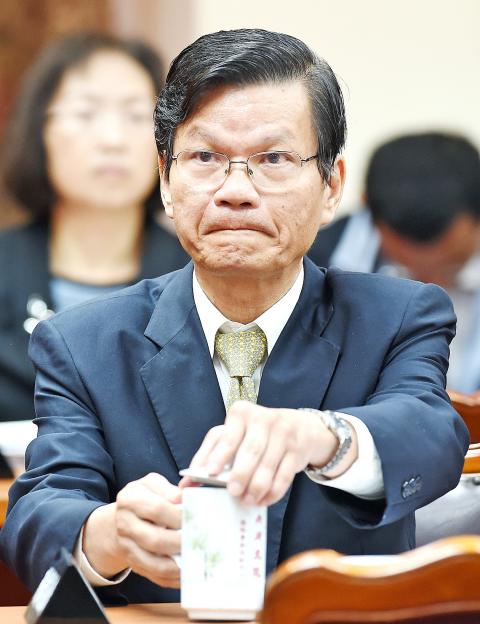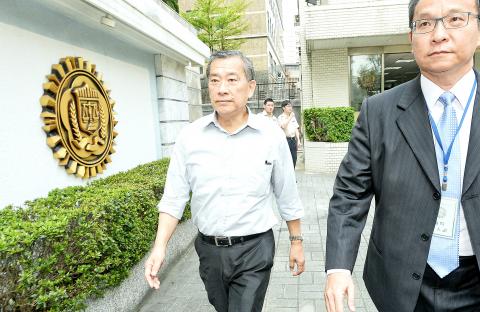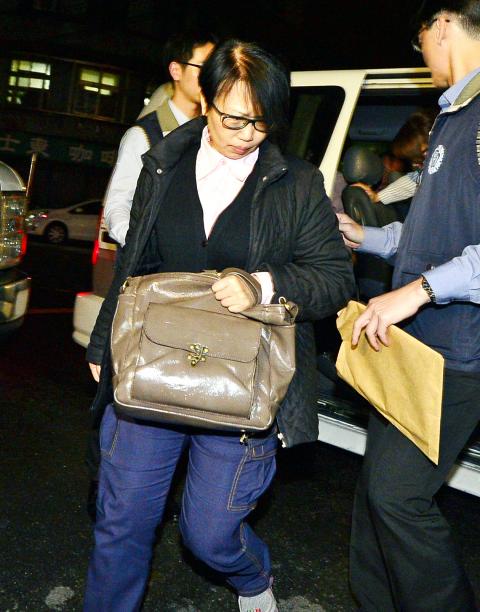Academia Sinica President Wong Chi-huey (翁啟惠) and OBI Pharma Inc (台灣浩鼎) chairman Michael Chang (張念慈) were yesterday both listed as defendants by prosecutors in a probe into insider trading allegations, while Ruentex Group (潤泰集團) chairman Samuel Yin (尹衍樑) and Wong’s wife were released after being questioned.
Judicial officials intensified their investigation yesterday, conducting raids on Wong’s office at Academia Sinica, the Wong family’s residences and the offices of Ruentex Group-owned Chung Chia Co (中嘉公司).
The raids were headed up by the Taipei Shilin District Prosecutors’ Office and the Ministry of Justice’s Investigation Bureau (MJIB), with investigators seizing documents and other evidence at seven locations across the greater Taipei area.

Photo: Liao Chen-huei, Taipei Times
Wong was first summoned for questioning at the MJIB’s Taipei Division Office yesterday afternoon, then taken to the Shilin District Prosecutors’ Office in the evening for further questioning.
Prosecutors also questioned Wong’s wife, Liu Ying-li (劉映理), for 40 minutes before she left the Shilin District Prosecutors’ Office accompanied by an assistant.
Prosecutors listed Wong as a defendant in the case and said they are likely to charge him with breach of trust, reportedly based on testimony given by Yin.

Photo: Lin Cheng-kun, Taipei Times
Of the 11 people summoned for questioning yesterday, Michael Chang and OBI Pharma finance division manager Chang Sui-fen (張穗芬) were also listed as defendants on the same charges.
Prosecutors said the raids on Wong’s office and Academia Sinica’s National Center for Genome Medicine were focused on gathering documents, telecommunications records, financial statements, computer databases and other evidence relating to Academia Sinica’s transfer of cancer-fighting medication to OBI Pharma.
The raids at Academia Sinica were contentious, because it was the first time in the nation’s history the judiciary had searched the president’s office at the prestigious institution and some saw the move as tarnishing the nation’s highest academic research body.

Photo: Wang Yi-sung, Taipei Times
Wong returned from US last week, before attending meetings at the Presidential Office and answering questions at the legislature in Taipei in an effort clarify his role and dissociate himself from accusations of insider trading and other financial irregularities.
The breach of trust accusations leveled against Wong showed that prosecutors have opened another investigation into the case, since they were already investigating alleged insider trading.
However, Yin turning state witness and providing testimony against Wong and the other suspects caused controversy, as some political commentators accused Yin and his associates of being the real culprits in behind-the-scenes manipulation of the OBI Pharma share price.
Many people have also claimed the probe is political persecution of Wong, directed by senior government officials to undermine his reputation, and said it would derail the development of the nation’s pharmaceutical industry.

CHAOS: Iranians took to the streets playing celebratory music after reports of Khamenei’s death on Saturday, while mourners also gathered in Tehran yesterday Iranian Supreme Leader Ayatollah Ali Khamenei was killed in a major attack on Iran launched by Israel and the US, throwing the future of the Islamic republic into doubt and raising the risk of regional instability. Iranian state television and the state-run IRNA news agency announced the 86-year-old’s death early yesterday. US President Donald Trump said it gave Iranians their “greatest chance” to “take back” their country. The announcements came after a joint US and Israeli aerial bombardment that targeted Iranian military and governmental sites. Trump said the “heavy and pinpoint bombing” would continue through the week or as long

TRUST: The KMT said it respected the US’ timing and considerations, and hoped it would continue to honor its commitments to helping Taiwan bolster its defenses and deterrence US President Donald Trump is delaying a multibillion-dollar arms sale to Taiwan to ensure his visit to Beijing is successful, a New York Times report said. The weapons sales package has stalled in the US Department of State, the report said, citing US officials it did not identify. The White House has told agencies not to push forward ahead of Trump’s meeting with Chinese President Xi Jinping (習近平), it said. The two last month held a phone call to discuss trade and geopolitical flashpoints ahead of the summit. Xi raised the Taiwan issue and urged the US to handle arms sales to

State-run CPC Corp, Taiwan (CPC, 台灣中油) yesterday said that it had confirmed on Saturday night with its liquefied natural gas (LNG) and crude oil suppliers that shipments are proceeding as scheduled and that domestic supplies remain unaffected. The CPC yesterday announced the gasoline and diesel prices will rise by NT$0.2 and NT$0.4 per liter, respectively, starting Monday, citing Middle East tensions and blizzards in the eastern United States. CPC also iterated it has been reducing the proportion of crude oil imports from the Middle East and diversifying its supply sources in the past few years in response to geopolitical risks, expanding

Pro-democracy media tycoon Jimmy Lai’s (黎智英) fraud conviction and prison sentence were yesterday overturned by a Hong Kong court, in a surprise legal decision that comes soon after Lai was jailed for 20 years on a separate national security charge. Judges Jeremy Poon (潘兆初), Anthea Pang (彭寶琴) and Derek Pang (彭偉昌) said in the judgement that they allowed the appeal from Lai, and another defendant in the case, to proceed, as a lower court judge had “erred.” “The Court of Appeal gave them leave to appeal against their conviction, allowed their appeals, quashed the convictions and set aside the sentences,” the judges